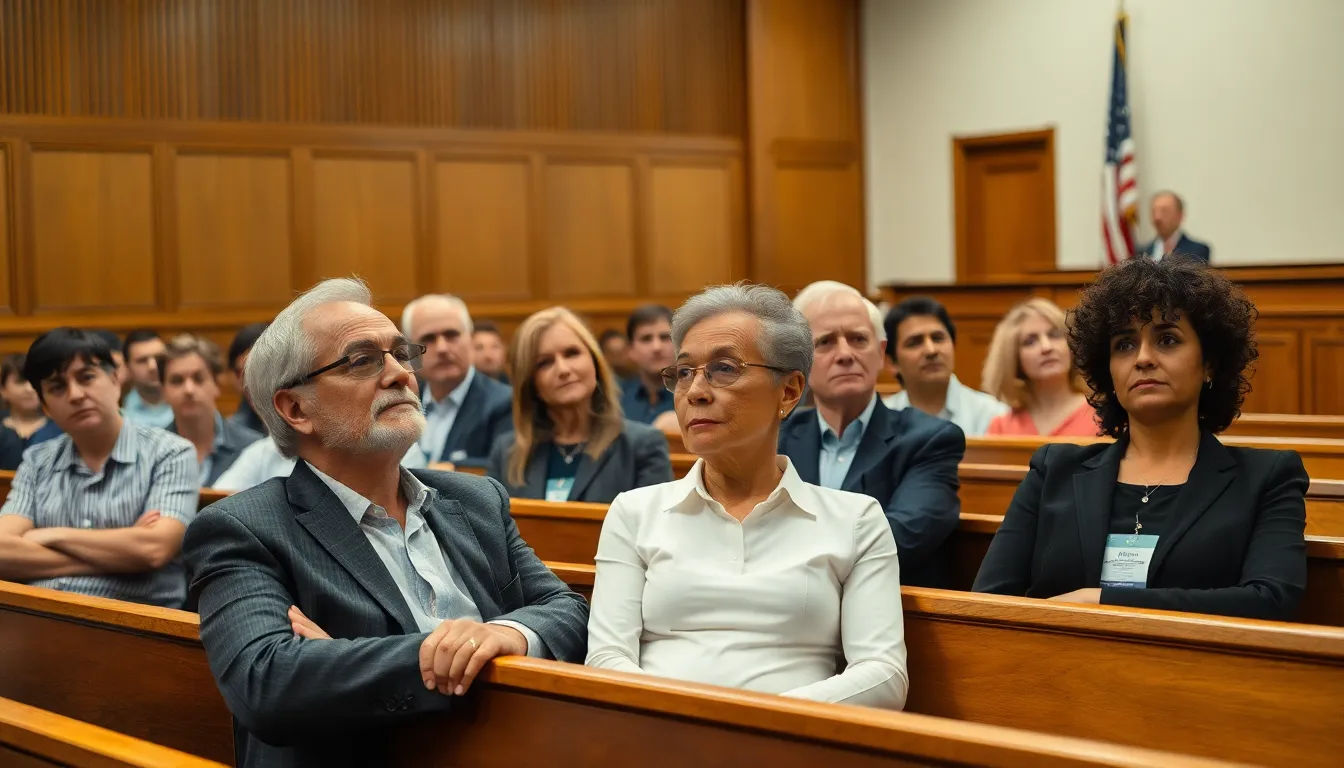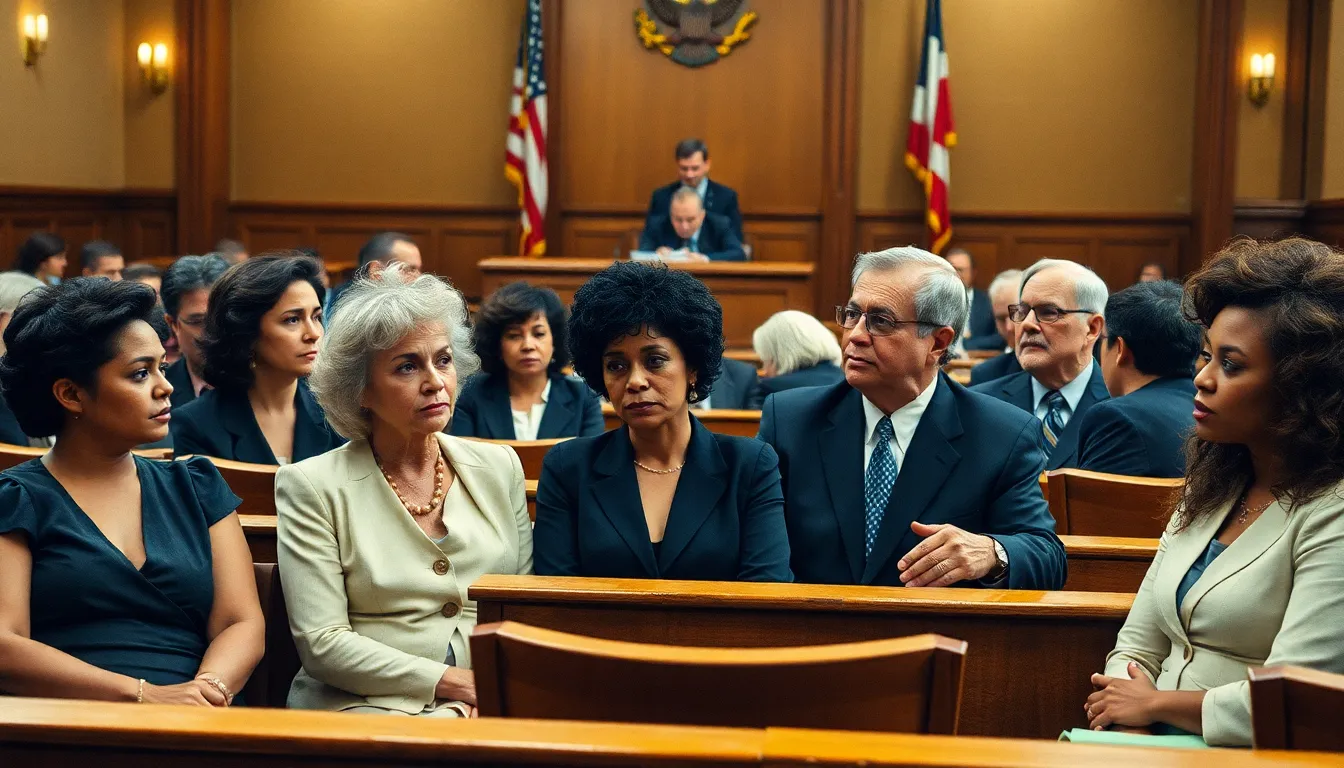In the world of civil cases, the number of jurors can feel like a mystery wrapped in a courtroom drama. Picture this: a group of ordinary folks, armed with their life experiences and a dash of common sense, come together to decide the fate of a case. But how many of these brave souls actually sit on the jury? Spoiler alert: it’s not as many as you might think!
Typically, civil cases feature a jury of six to twelve members, depending on the jurisdiction and the stakes involved. This small but mighty team has the power to influence outcomes, making their role both crucial and, let’s face it, a bit nerve-wracking. So, if you’ve ever wondered how many jurors are needed to settle disputes in civil court, you’re in for a treat as we unravel the numbers and the reasons behind them.
Table of Contents
ToggleOverview Of Civil Cases
Civil cases address disputes between individuals or entities seeking compensation or resolution rather than criminal prosecution. Cases may range from contract disagreements to personal injury claims. Jurisdiction plays a crucial role in determining case specifics, including jury size.
Typically, civil cases involve a jury of six to twelve members. The selected number often reflects the case’s significance and jurisdictional rules. For instance, smaller claims may use fewer jurors, while larger disputes tend to warrant a full jury panel.
Jurors in civil cases hold significant responsibility. Their decisions impact legal outcomes and financial implications for all parties involved. Jurors engage in deliberation, weighing evidence presented during the trial before reaching a verdict.
Understanding juror roles helps clarify the judicial process. Jurors listen to testimonies, assess credibility, and apply legal standards to the facts. They also consider the judge’s instructions regarding applicable laws, ensuring their verdict aligns with legal requirements.
Overall, the composition and function of juries in civil cases is key to upholding justice. Variations in juror numbers reflect local legal customs and adapt to the nature of the case. Recognizing these elements enhances comprehension of civil litigation outcomes.
Juror Requirements In Civil Cases


Juror requirements vary across jurisdictions, yet certain criteria remain consistent for civil cases. Understanding these criteria is vital for the judicial process.
Age and Citizenship
Generally, jurors must be at least 18 years old. This age requirement ensures participants possess maturity for decision-making. Citizenship is also essential; only U.S. citizens can serve on juries. Many jurisdictions enforce this requirement to ensure that jurors understand the legal implications of their responsibilities. Some areas may also require jurors to be residents of the state where the case is tried. These criteria help maintain a jury composed of informed individuals.
Legal Eligibility
Legal eligibility involves several factors beyond age and citizenship. Individuals must not have any felony convictions that affect their capacity to serve. Many states disqualify jurors who are mentally incompetent, as defined by the law. Some courts may also consider previous jury service; individuals who recently served might not be eligible. Specific exceptions exist, depending on jurisdictional rules. Understanding these qualifications ensures that jurors reflect the community’s integrity and uphold the justice system.
Standard Number Of Jurors
Civil cases usually involve juries ranging from six to twelve members. Jurors play a crucial role in deliberating cases, weighing evidence and making informed decisions.
Typical Jury Size
Typically, a civil jury consists of twelve jurors in many jurisdictions. Some states permit six jurors for less complex cases. A size of six suits smaller disputes, while more significant cases require twelve. Jurors’ decision must be unanimous or reach a specified majority, depending on jurisdiction. Size tends to reflect the case’s complexity, ensuring comprehensive deliberation.
Variations By Jurisdiction
Jurisdictional differences lead to variations in jury size in civil cases. For instance, federal courts generally opt for twelve jurors. States like California allow six jurors for certain civil disputes. Civil jury requirements also depend on the type of case and its monetary stakes. Smaller claims often result in fewer jurors, whereas larger cases demand a full panel. These variations ensure that juries align with local legal customs.
Impact Of Jury Size On Verdicts
The size of a jury significantly affects the outcomes of civil cases. Juries consist of six to twelve jurors, and this composition influences deliberation, decision-making, and ultimately, verdicts.
Advantages Of Larger Juries
Involving larger juries offers several benefits. Increased juror numbers lead to a wider range of perspectives, making the deliberation process more comprehensive. Diverse viewpoints can enhance the quality of discussions and reduce the likelihood of bias. Furthermore, larger juries may reduce the risk of a hung jury, where a lack of consensus prevents reaching a verdict. Consequently, the final decision reflects a broader community standard, which often results in more equitable outcomes. Research shows that larger juries are more adaptable, particularly in complex cases requiring extensive evidence review and discussion.
Disadvantages Of Smaller Juries
Smaller juries present certain challenges that can impact verdicts. With fewer jurors, the risk of bias increases as there are fewer voices to balance opinions. This limitation can lead to a more dominant influence of individual jurors, skewing the deliberation process. Additionally, reaching unanimity or the necessary majority becomes more difficult, increasing the potential for hung juries. Smaller juries may struggle with complex cases since less diversity in perspectives can result in overlooked evidence or arguments. Ultimately, these factors can lead to less reliable or representative verdicts in civil disputes.








